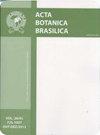New records of Plantago trinitatis: spontaneous regeneration of a species considered extinct or sampling gaps on Trindade Island?
IF 1.1
4区 生物学
Q4 PLANT SCIENCES
引用次数: 0
Abstract
Trindade Island has lost much of its original vegetation cover as a result of approximately three centuries of human occupation and intense herbivory caused by invasive mammals. Since the eradication of some of these herbivores, the recovery of some plant species has started. Plantago trinitatis is an endemic herb from Trindade Island, which was considered extinct until 1998, when it was rediscovered in the higher areas of the island. The regeneration of the species was attributed to the soil seed bank. This communication reports new records of P. trinitatis close to sea level on Trindade Island, at lower altitude than previously documented. The new records suggest that P. trinitatis is recolonizing the island, but leaves doubts whether sampling gaps in the past have led to the non-detection of the plant in its vegetative form in these locations, emphasizing that other species considered extinct may share this issue. Regardless of recolonization or sampling gaps, the eradication of invasive herbivores is necessary as a strategy to protect local flora and native vegetation. Understanding the population status can help in making decisions about the need of environmental management and species population recovery.三位一体车前草的新记录:一个被认为已经灭绝的物种的自发再生或在特林达德岛的采样空白?
由于大约三个世纪的人类占领和入侵的哺乳动物造成的强烈草食,特林达德岛失去了大部分原有的植被覆盖。由于一些食草动物被消灭,一些植物物种的恢复已经开始。车前草(Plantago trinitatis)是特林达德岛(Trindade Island)的一种地方性草本植物,直到1998年才被认为已经灭绝,当时它在岛上的较高地区被重新发现。该物种的更新归功于土壤种子库。本通讯报告了Trindade岛上接近海平面的P. trinitatis的新记录,其海拔比以前记录的要低。新的记录表明,三位塔拟虫正在岛上重新定居,但令人怀疑的是,过去的采样间隔是否导致在这些地点没有检测到这种植物的营养形态,强调其他被认为灭绝的物种可能也有同样的问题。无论再定殖或采样间隙如何,根除入侵食草动物作为保护当地植物群和原生植被的策略是必要的。了解种群状况有助于制定环境管理和种群恢复的决策。
本文章由计算机程序翻译,如有差异,请以英文原文为准。
求助全文
约1分钟内获得全文
求助全文
来源期刊

Acta Botanica Brasilica
PLANT SCIENCES-
CiteScore
2.30
自引率
9.10%
发文量
32
审稿时长
6-12 weeks
期刊介绍:
Experimental, theoretical and applied papers on all aspects of plant (including algae) and fungi biology are welcome. The submitted manuscript or its essential content must not have been published previously or be under consideration for publication elsewhere. Contributions should be substantial, written in high-quality English and show general interest. We expect that the submitted manuscript presents a great novelty in Botany, and this should attract a wide audience. Considering this, case studies are only considered if the narrative and implications are provided to be of general interest. Thus, manuscripts that report aspects of local interest are discouraged unless the implications of the findings are wide-reaching. Manuscripts with agronomic subjects are expected to contain a substantial amount of basic plant biology. Please see below some details for specific area.
 求助内容:
求助内容: 应助结果提醒方式:
应助结果提醒方式:


